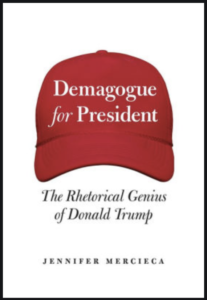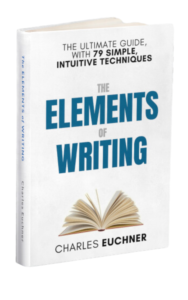Growing up in Detroit and northern California, Jennifer Mercieca used to watch the TV news with her father. Her dad, an autoworker, was an immigrant from Malta, about 60 miles from Sicily, which, she notes, is “the birthplace of rhetoric.” Over time, as she explored journalism and public affairs, she developed an interest in rhetoric. But it wasn’t until college that she started to explore the topic in depth.
“I liked Reagan as a kid and thought of myself as a Republican, but I didn’t memorize his speeches or anything like that,” she said.
 In her first rhetorical analysis as a student at the University of the Pacific, she dissected the eulogies for Richard Nixon in 1994. Robert Dole pronounced the post-World War II era “the Age of Nixon.” Bill Clinton asked that “may the day of judging President Nixon on anything less than his entire life and career come to a close.” But Mercieca was not impressed. “I didn’t find those speeches inspiring,” she said.
In her first rhetorical analysis as a student at the University of the Pacific, she dissected the eulogies for Richard Nixon in 1994. Robert Dole pronounced the post-World War II era “the Age of Nixon.” Bill Clinton asked that “may the day of judging President Nixon on anything less than his entire life and career come to a close.” But Mercieca was not impressed. “I didn’t find those speeches inspiring,” she said.
 Since earning a Ph.D. in speech communication at the University of Illinois in 2003, she has taught at Texas A&M University. Her new book, Demagogue for President: The Rhetorical Genius of Donald Trump (Texas A&M University Press), identifies six key rhetorical maneuvers of the president. Three of them draw him close to his audience; the other three create a division between him and his supporters and the rest of the world.
Since earning a Ph.D. in speech communication at the University of Illinois in 2003, she has taught at Texas A&M University. Her new book, Demagogue for President: The Rhetorical Genius of Donald Trump (Texas A&M University Press), identifies six key rhetorical maneuvers of the president. Three of them draw him close to his audience; the other three create a division between him and his supporters and the rest of the world.
Her favorite rhetoricians? “I love to read Thomas Jefferson, I love Abraham Lincoln’s speeches, I’m amazed by how presidents like Teddy Roosevelt, Woodrow Wilson, Franklin D. Roosevelt, John F. Kennedy, Ronald Reagan, and Barack Obama took advantage of then-new media to connect with Americans—expanding the role of the presidency by expanding its reach.”
Mercieca has always been fascinated with the heroic figure in politics. Her first book, Founding Fictions, examines the way the nation’s revolutionary generation defined the new republic’s citizens as romantic heroes, tragic victims, or ironic partisans. Her second book, The Rhetoric of Heroic Expectations (coauthored with Justin Vaughn), explains how Barack Obama rose to the White House with heroic rhetoric, only to struggle with the disappointment of followers who expected more from his presidency.
The surprising takeaway from Mercieca’s book on Trump: He is not the random and chaotic figure he appears to be. During the 2016 campaign he was calculated in his wild attacks and claims as he depicted himself as a historic, blunt-talking heroic businessman and denigrated his opponents as stupid, venal, and corrupt.
How do you define rhetoric? What makes it different from demagoguery?
I think of rhetoric as Aristotle did: as a method for decision making in a political community. Aristotle said that “rhetoric is the counterpart of dialectic”—both were methods, but dialectic would lead to sophia (philosophical truth) and rhetoric would leader to phronesis (practical truth). Both were necessary, in Aristotle’s view, because some decisions would need to be made under circumstances that required phronesis rather than sophia.
Aristotle explained how ethos, pathos, and logos work to help persuade, but the fundamental purpose of rhetoric for him was political decision-making. He didn’t explicitly write about ethics and rhetoric, but if you understand his Politics, Rhetoric, and Nicomachean Ethics as a system, then his criteria for justice—giving your neighbor what is good for them and what is owed to them—works for an ethics of rhetoric as well.
So rhetoric is an ethical exercise, a way of bringing people together to solve problems.
When I teach courses on rhetoric, argument, political communication, and propaganda I explain that rhetoric is addressed to people who know themselves to be addressed; it is a meeting of minds in which one person asks another person to think like they do, to value the same values, to remember or forget history in the same way. It doesn’t force. It affirms human dignity by inviting. A person who seeks to persuade gives good reasons and formulates arguments in the best way they know how, always affirming that the recipient of the persuasive message has a mind, values, and experiences of their own and that they may not change their mind. Rhetoric uses persuasion as a tool of cooperation.
And demagoguery?
 Demagoguery uses rhetoric as a tool of control. It is not “persuasion,” but compliance-gaining. The opposite of rhetoric isn’t “truth,” it’s force and violence. Compliance-gaining is not a meeting of minds; it does not invite; it does not value the thoughts, feelings, or experiences of the other person. Compliance-gaining does not affirm human dignity and it doesn’t make good arguments.
Demagoguery uses rhetoric as a tool of control. It is not “persuasion,” but compliance-gaining. The opposite of rhetoric isn’t “truth,” it’s force and violence. Compliance-gaining is not a meeting of minds; it does not invite; it does not value the thoughts, feelings, or experiences of the other person. Compliance-gaining does not affirm human dignity and it doesn’t make good arguments.
A person may force a change in someone’s mind with compliance-gaining strategies. But because minds are changed without consent, compliance-gaining is a short-sighted strategy that will ultimately undermine the relationship between those people.
How did you get interested in rhetoric? Was it politics or literature or what? Can you note one or two early influences and what wisdom you still carry from those early lessons?
I always loved words. I was a really early reader and I would read anything I could: cereal boxes, dictionaries, kid’s books, grown up books, you name it. I also watched the news all the time with my Dad. I was in journalism in high school and on the speech team in college, where I majored in communication and worked in radio and TV. I thought that I would be a journalist, but I ended up studying rhetoric because I wanted to understand the ways that democracy and citizenship and rhetoric work together.
The first book that really mattered to me as an undergrad was Plato’s Republic. I loved that it was an entire book about how to form a just political community and I loved the dialectic game. But something seemed off about Plato’s version of things too and I think part of my interest in political theory and rhetoric has been in trying to sort that all out.
When you look at the “genius” of Donald Trump’s rhetoric, how much do you think is conscious and deliberate? How much comes naturally, from his own superficiality, prejudice, and sadism?
I know that “genius” is an awkward word to use with Trump. Rhetorical theorist Kenneth Burke described Hitler’s “demagogic effectiveness” in his 1941 book review of Mein Kampf, and that’s essentially what I mean. I used “genius” because Trump likes to call himself a genius and I thought that would make more sense to a general audience than “demagogic effectiveness.”
That being said, Trump is very strategic and consistent in how he uses language to distract, attack, and ingratiate himself with his followers.
I don’t know where he learned it. He hasn’t released his school transcripts, so we don’t know if he took a class in rhetoric. One of his ex-wives said that he had a copy of Hitler’s speeches, but we don’t know if he ever read them. A dangerous demagogue is an unaccountable leader and Trump’s rhetorical strategies are designed to prevent us from holding him accountable. I think that he’s probably developed these language strategies over a lifetime of refusing to be held accountable.
Aristotle famously said that all virtues can be turned into vices when used to extremes. Can an honest and well-intentioned person do the opposite and turn Trump’s techniques—ad populum, ad baculum, paralypsis, ad hominum, reification, and tribalism (my catch-all term for nationalism, American exceptionalism, etc.)—into positive and constructive appeals? If so, how?
Accountability is the difference between a “heroic demagogue” who leads the people justly and a “dangerous demagogue” who leads unjustly. A dangerous demagogue uses language in ways that prevent us from holding him or her accountable.
I argue in my book that Trump repeatedly used six strategies—three to bring him closer to his followers and three to separate himself and his followers from everyone else. For some of Trump’s strategies, the answer is yes—they could maybe be used for good ends; for others, the answer is no.
A heroic demagogue could use American exceptionalism, or paralipsis, or ad populum (perhaps) in ways that were accountable.
The rest of these strategies are fallacies that are designed to distract our attention from the central issue of the debate, to dehumanize, and to deny standing. These last strategies are poisonous to public argument. Of course, there are so many other rhetorical figures that a heroic demagogue could use, there’s no need to limit a heroic demagogue to the six things that Trump did.
In interviews and debates, Trump talks in a rush, speaks over other people, and interrupts, making it hard for the other person to respond thoughtfully. Trump probably produces more “elevator moments” than anyone. Are there techniques to confront this bulldozer effect?
I think of this as part of his ad baculum (threats of force or intimidation) strategy. It’s a kind of force to overwhelm the opposition so that they can’t enter into debate or discussion. It’s certainly a way to prevent your interlocuter from holding you accountable for your words or actions.
The only way to confront it is to break the “naturalness” of the “image event,” which is really awkward. What I mean by that is that interviews operate by specific rules: reporters ask questions and politicians respond—it isn’t “scripted,” but there’s a script of sorts. Interviews operate as a certain kind of game. Trump violates the script of those events and the only way to stop him is to intervene and call out the violation. But doing that only highlights the unnaturalness of the image event itself. It acknowledges that the news is itself a spectacle and a fraud.
The only way to confront Trump’s violation of the rules of the game is to admit that it’s a game in the first place. Acknowledging that plays into Trump’s hands, unfortunately. It’s an asymmetric game in Trump’s favor now and that’s why he has been winning.
One of Trump’s most powerful techniques is to overwhelm people—journalists, fans, opponents, other public figures, etc.—so they can’t respond thoughtfully. It also undermines the power of facts, since facts get caught up in a constant churn with lies, insinuations, and uncertainty.
Trump’s whole rhetorical strategy is to use language as a kind of force (he claims to be a “counterpuncher,” but he uses force by default). He uses rhetoric for compliance-gaining, which is anti-democratic. He uses language to overwhelm his opposition. I sometimes call it “weaponized” rhetoric or communication—the widespread use of ad baculum. It’s exhausting to try to track all of Trump’s plots and sub-plots, to keep up with his lies and distortions, to refute all of his fallacies. It probably can’t be done. What’s worse, is that in the process he has made you look foolish and he’s already moved on to other lies, distortions, and fallacies. His is a very effective strategy that allows him to get away with whatever he likes.
Trump also trucks in false equivalence, which disables people’s power of discernment—treating minor non-issues (like Hillary Clinton’s use of a private email account for some public business, which many of Trump’s aides have done as well) with major outrages (violating the emoluments clause of the Constitution, undermining masking and testing, using pardons for coverups, and much more).
He repeatedly uses tu quoque (appeals to hypocrisy) to attack the ethos of his opposition. He may accuse them of doing the same things he does, or bring up arbitrary issues as equivalences, or say that they’re self-interested, or hypocrites in some other way. It is a pernicious strategy because it erodes public trust. It’s a strategy designed to deny standing to his opposition so that they can’t legitimately criticize him or hold him accountable. Anyone who opposes Trump loses credibility themselves, which makes him that much harder to oppose.
What about Trump’s demagoguery—and others’ response to it—gives you despair? What gives you hope?
The despair comes when I think about how effective these strategies have been for him; the hope comes when I see so many people resist him; then the despair comes back when I see that his base has held firm.
I despair because our public sphere is broken and we’re unable to use language to solve political problems—we’re unable to use rhetoric as a method to decide practical truth (phronesis). Trump didn’t break our public sphere himself, but he took advantage of crisis levels of pre-existing distrust, polarization, and frustration and used dangerous demagoguery to attack America.
I still have hope that we can rebuild trust and bridge polarization and end Americans’ frustration with each other and their government, but it’s much harder after what Trump has put us through over the past five years.


